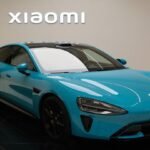BYD, a leading electric vehicle manufacturer, has recently initiated tests on solid-state EV batteries in its Seal model. These batteries have the potential to significantly increase the total driving range of the vehicle, with initial tests suggesting a range of nearly 1,200 miles (1,875 km).
The company has been researching and developing solid-state battery technology for over a decade, reaching a milestone last year with the testing of 20 Ah and 60 Ah solid-state battery cells. BYD’s Chief Technology Officer for the battery business, Sun Huajun, confirmed earlier this year that the company plans to launch vehicles powered by solid-state batteries in 2027.
At the China All-Solid-State Battery Innovation and Development Summit in 2025, BYD announced that solid-state batteries have been installed in the Seal EV and are currently undergoing road testing. The company aims to finalize testing by 2027 and begin mass production of vehicles equipped with solid-state batteries.
BYD’s solid-state batteries boast an impressive energy density of 400 Wh/kg, nearly double that of current lithium-ion batteries. Local reports have indicated that these batteries achieved a record range of 1,500 km (932 miles) in just 12 minutes of charging, showcasing their efficiency and performance.
The Seal, BYD’s electric sedan comparable to Tesla’s Model 3, is expected to be the first vehicle equipped with solid-state batteries, with production slated to begin in 2027. Subsequent models will follow suit in 2028 and beyond.
The introduction of solid-state batteries is anticipated to revolutionize the EV market, offering longer driving ranges, faster charging times, and reduced costs. BYD’s competitive pricing, combined with advanced technologies such as ultra-fast chargers and smart driving features, positions the company for continued growth in the EV sector.
BYD will face competition from other automakers like CATL, Mercedes-Benz, Volkswagen, Stellantis, and Nissan, all of whom are also working towards launching EVs with solid-state batteries by 2027 or 2028. Nissan’s director of product planning in Europe, Christop Ambland, confirmed the company’s timeline for solid-state battery integration, stating that Nissan will be ready for SSB technology in 2028.
Overall, BYD’s advancements in solid-state battery technology signify a significant step forward in the electric vehicle industry, setting the stage for enhanced performance and sustainability in future EV models.






